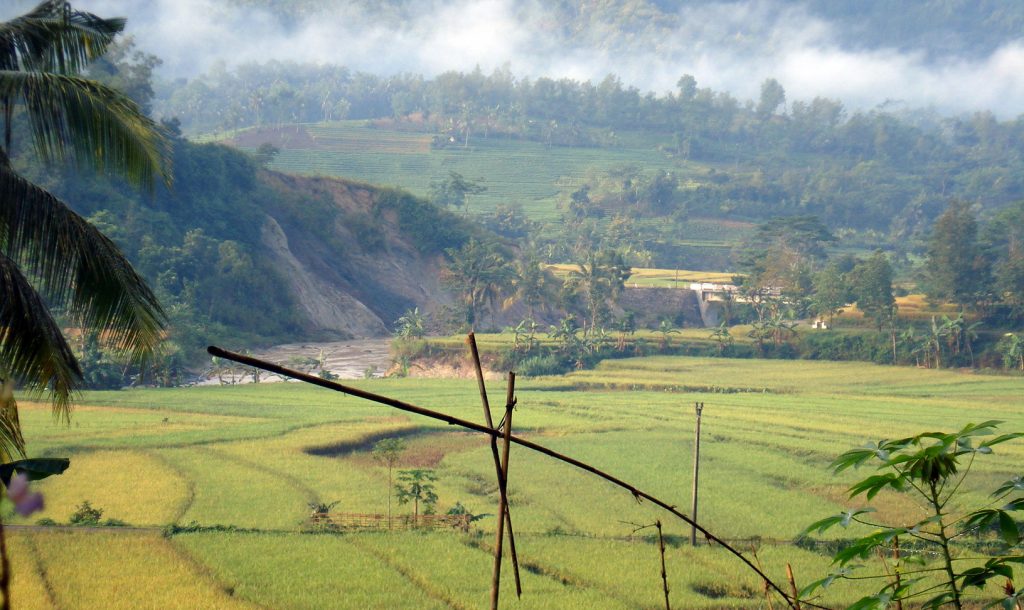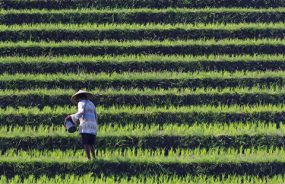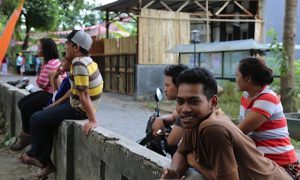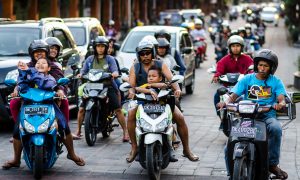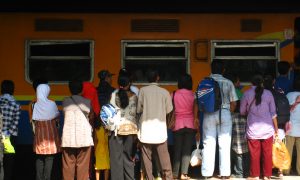The prospect of a food crisis during the COVID-19 pandemic has received a lot of attention from the Indonesian government, civil society and media. Some of this attention has an alarmist tone. A recent article in Koran Tempo, for example, is titled “The threat of famine in the middle of a pandemic”. The article claims the government is mitigating the potential for famine caused by the likely drought later in the year, by maintaining crop production and redistributing surplus food to areas suffering deficits. Both of these issues resonate with the government’s preoccupation with the availability of food rather than more pressing issues of food security: how people access food and its nutritional quality. The government’s focus on food availability is also at the root of Indonesia’s agro nationalism.
Indonesia’s agro nationalism has grown over the last decade. At the core of the government’s agro nationalist agenda is to achieve more domestic food production for the goal of national food self-sufficiency. It has led to the government preserving and opening land for agricultural production, promoting an anti-food import agenda, regulating for the centralisation of the agricultural sector, and emphasising Indonesia’s agrarian identity in policy and propaganda. To support these actions the government has provided the agricultural sector with ever increasing subsidy.
Agro nationalism is also agro because of its aggressive qualities. Politicians and prominent commentators accuse “mafia” of undermining the Indonesia’s agricultural sector by racketeering. Also, government leaders see that Indonesia requires more agricultural development to address long term production inadequacies and better compete in international agricultural trade. To overcome such issues, President Jokowi has enabled the army among other institutions to involve themselves more in the agricultural sector to secure the availability of food for the nation and develop its agricultural sector. Yet the issue of availability is the least important aspect of food security for Indonesia to be focusing on, particularly during the pandemic.
A quarter of a century ago the United Nations Food and Agricultural Organisation (FAO) listed Indonesia as one of 80 countries facing food shortages, but this is not the case today. If we go by the FAO’s estimates, Indonesia ranked among the top producers in the world for multiple staple food commodities in 2018. For the same year, World Bank data indicates Indonesia was the world’s 18th largest food importer by value. Nowadays, Indonesia has plenty of food available, whether produced at home or imported from abroad. The main issue of food security is instead, as decades of research has shown, how the poor access healthy food.
Indonesia’s leaders and officials have largely neglected the question of how the pandemic will influence the poor’s access to food and exacerbate existing food security issues. The well-intentioned concern about people’s food security perhaps clouds the fact that politicians and officials who have paid hefty sums for their positions make decisions for the agricultural sector. We rarely examine who really benefits from the government’s recent measures to address Indonesia’s food security. This lack of focus is, perhaps, because of who stands to benefit.
Indonesia’s security institutions are benefitting from agro nationalism. In the democratic era, the army became involved in the agricultural sector when President Susilo Bambang Yudhyono included them in a 2011 instruction to respond to climate change threats against the nation’s food security. During the late Yudhoyono presidency, the army began involving itself more in activities organised by the Ministry of Agriculture within a broader “Army Enters the Village” development campaign, reminiscent of a similar program from the Suharto era. The army has since assumed an ever-prominent role in the agricultural sector.
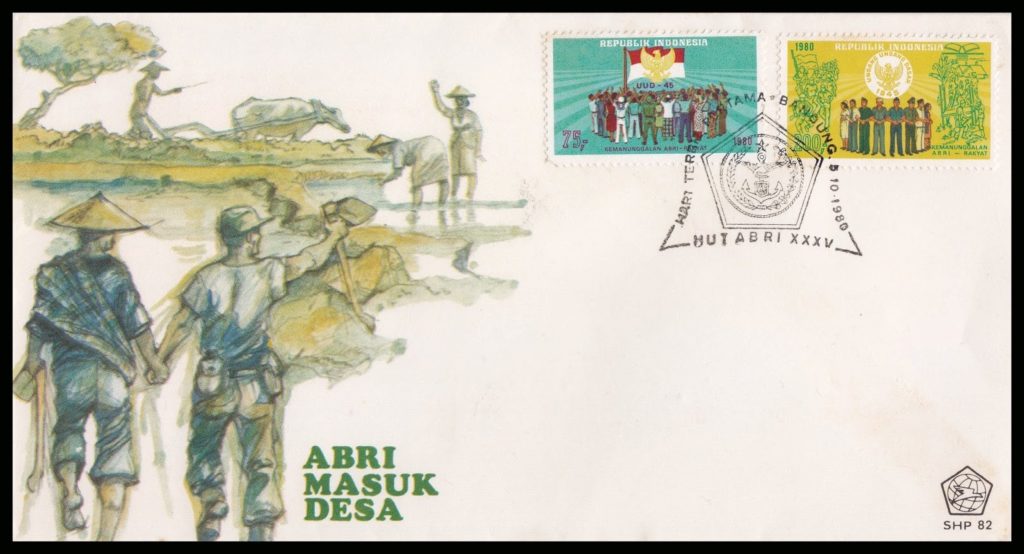
“Army enters the village” postcard from the New Order.
In 2014, President Jokowi set a target of three years in order to achieve national food self-sufficiency. He invited government institutions involved to draw on the army to help them achieve this goal. The army has expanded its role in the agricultural sector without a clear legal basis and maintains it is assisting farmers’ agricultural production and providing support to the needy. Over the past five years the Ministry of Agriculture and the National Logistics Agency referred to as Bulog (responsible for the government’s food procurement, transport, and storage) have signed many “working together” arrangements and Memorandums of Understanding with the army to guarantee national food security. These agreements have allowed for plenty of photo opportunities for soldiers to get in the mud with farmers.
But beyond propaganda, such agreements have allowed the army more engagement with elites in village communities. For example, the army along with the police are tasked with checking supply chains, particularly for subsidised chemical fertilizer delivered to village kiosks run by relatively wealthy villagers, to ensure distribution at the government regulated price. These checks enable low-level soldiers’ great opportunities to extract money from villagers that are at the focal point of local supply chains to approve stockpile lists, requests from the government for infrastructure and machinery support, offer their protection, and of course for not reporting regulatory violations. The army’s expanded role in the agricultural sector has also meant low ranking village-level soldiers (Babinsa) request data as well as offer farming advice in place of agricultural extension officers from local Departments of Agriculture that, since 2009, have been increasingly casualised.
The Ministry of Agriculture itself has come to adopt a more militarised disposition towards its sector. Since October 2019, Syahrul Yasin Limpo has led the Ministry of Agriculture. This former governor of South Sulawesi has long shown fascination with the army and has a penchant for wearing aviators and camouflage. Upon assuming the position, Limpo rebranded existing sub-district agricultural support offices, from where agricultural extension officers work, as Strategic Agricultural Technical Command Units, or KOSTRATANI, and “optimalised” their role. The KOSTRATANI abbreviation is similar to KOSTRAD, the Indonesian army’s Strategic Reserve Command, and the two terms are even sometimes confused on the Ministry of Agriculture’s own website.
The role of these support offices remains monitoring and collecting agricultural statistics, carrying out training, and providing services at the sub-district level to better “guarantee the availability of food commodities to meet the needs of 267 million Indonesians”. Optimalised KOSTRATANI are meant to pass “real time” reports on local agricultural conditions to provincial and national level agricultural support offices. At the national level, an “Agricultural War Room” launched this February is meant to collate these local-level reports to inform Limpo’s decision-making. At the Agricultural War Room’s launch, Limpo even claimed its surveillance power was similar to that of the Pentagon. But the Ministry’s boasts do not stop with real time monitoring prowess. The Ministry of Agriculture also recently claims to have discovered a eucalyptus-based cure for COVID-19! Indeed, if we were to believe the Ministry’s own propaganda, there is nothing that it cannot do.
Unfortunately, however, the Ministry of Agriculture seems unable to replace its graft-ridden agricultural import recommendation system with a tariff system. Implementing a tariff system in place of a quota system would potentially lessen opportunities for corruption. Private importers bringing commodities into the country would no longer need to bribe officers at the Ministry of Agriculture for recommendation letters. Such regulatory reform has long been proposed by senior politicians such as Rizal Ramli but never acted on by the Jokowi administration. Instead, over the last five years the quota system has become even more valuable to rent-seeking officials because of agro nationalism. The government’s promotion of a protectionist agenda for national food self-sufficiency produces opportunities for higher premiums to attain import recommendation letters from the Ministry, as well as regulatory peculiarities that create opportunities for bribes. While government leaders have vaguely accused groups of officials within the Ministry of Agriculture, the Ministry of Trade and Bulog as being part of a corrupt “food mafia”, there are never specific accusations about who members of these food mafia are. It is only in Corruption Eradication Commission cases, such as the infamous Prosperous Justice Party’s (PKS) beef scandal in 2013, as well as more recent garlic and fertilizer bribery cases involving politicians from the Indonesian Democratic Party of Struggle (PDIP) and Golkar respectively that we get to see details about how corruption in the agricultural sector works.
Politicians also frequently make unspecific claims that accuse agricultural traders as well as small scale brokers in villages of being part of the food mafia. These amorphous accusations can serve to stigmatise potentially anyone involved in agricultural markets as part of “mafia”. Such stigmatisation creates a precedent for the government to act against particular traders it finds troublesome to better guarantee food availability for the nation. Yet rarely do media reports link actual acts of coercion, a central feature of mafia organisations, in agricultural value chains to so-called mafia. Instead, the term mafia is more often used by politicians and in popular media to refer to groups that profiteer.
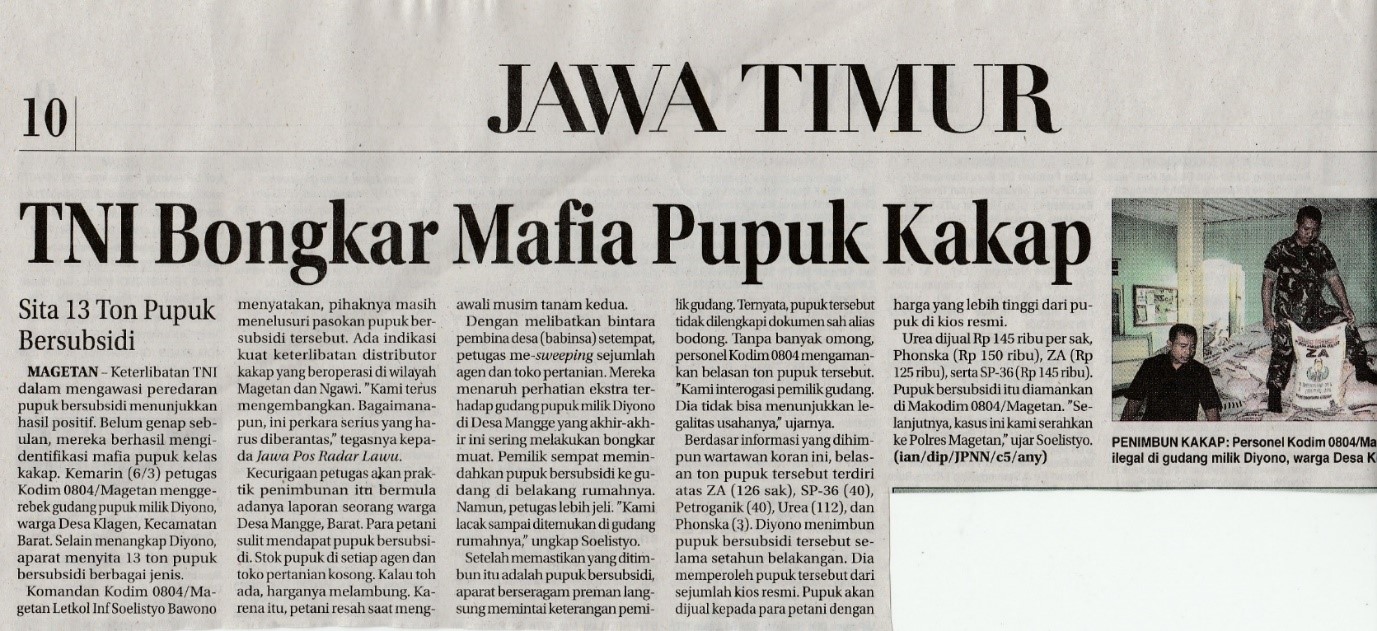
Headline reads ‘The military unloads a large mafia’s fertilizer’. Source: Jawa Pos, 7 March 2015.
The idea that food traders are profiteering during the pandemic has given politicians even more reason to justify expanding the state’s role in food markets. The Minister of State-Owned Enterprises, responsible for Bulog, Erick Thorir recently warned “There are mafia in all businesses that we are involved with. It is fine to profit, but do not destroy farmers’ incomes. State Owned Enterprises must not be tricked… Farmers must not be sacrificed. The people must buy at a good price… Certainly Pak Buwas (referring to Budi Waseso, head of Bulog and former Police General) and I want the rice mafia to wake up”. Earlier this May, President Jokowi indicated he is prepared for the government to take further action to control sugar and red shallot price spikes. “I ask for checks in the field, so that everything can be controlled, and the public can increase their purchasing power,” he said. How can the government exert more control?
The government has introduced new legislation that gives it a more prominent role in the agricultural sector. Indonesia’s new Sustainable Agricultural Cultivation Law (22/2019) was criticised in media because of articles that criminalise small farmers for not reporting unique seed discovery to the government. However, a less commented on aspect of the new law is that it ascribes more authority to the central government to plan for national food production. The previous Suharto era Sustainable Agricultural Cultivation Law (12/1992), implemented when the agricultural sector was actually more centralised, is less specific about the government’s role in agriculture. One important aspect of the law in relation Jokowi’s desire for more price control is that Article 64 obliges the government to protect “national strategic agricultural cultivation” by buying up surplus harvests.
In line with Article 64 and in response to food import reductions due to the pandemic, the government is giving Bulog opportunity to play a greater role in the domestic food market. Since its transformation from a government agency under the president to a state-owned enterprise in 2003, Bulog’s procurement role has focused more on importing cheap rice from abroad for its welfare programs. But recently, along with restructuring Bulog’s loans to ease financial pressure, the Ministry of Trade increased Bulog’s guaranteed purchase price for unhulled rice for the first time in five years. These new government purchase prices are slightly lower than prices offered by rice traders that I am familiar with at present, but are certainly much more competitive. Though an explanatory regulation for the new Sustainable Agricultural Cultivation Law defining “surplus harvests” is not yet available, there are precedents that suggest that the army may be engaged to transport harvests that the government has bought.
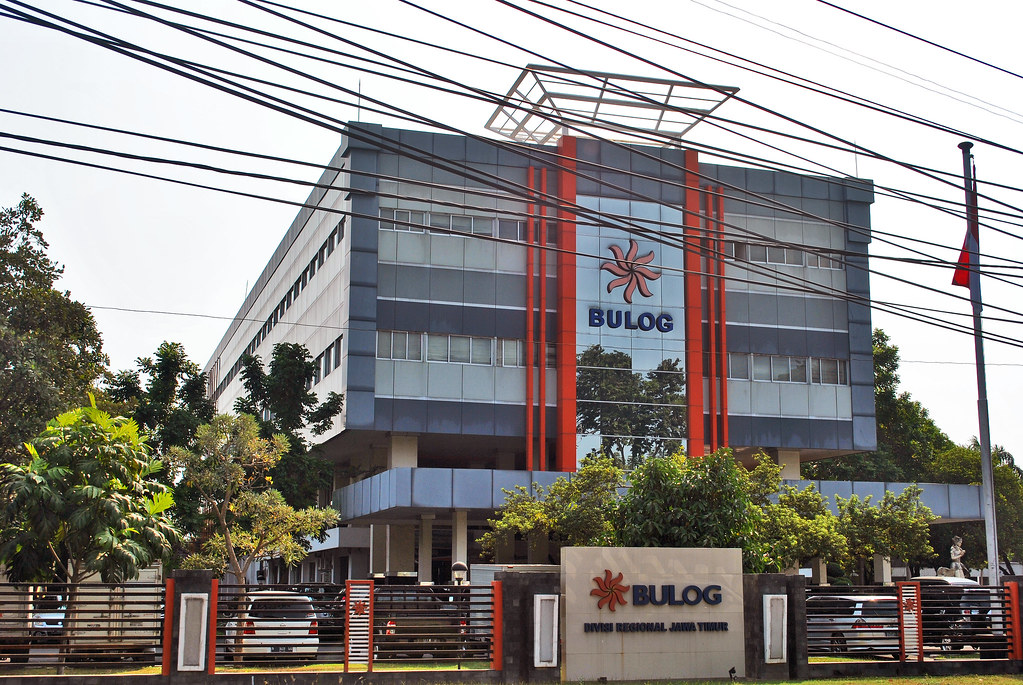
“Bulog A Yani” by Ya, saya inBaliTimur is licensed under CC BY-SA 2.0
Local army units have previously given logistical support to Bulog when required. For example, controversially in early 2018 soldiers in South Sulawesi “encouraged” farmers to sell their unhulled rice to Bulog for the government purchase price, which was then set significantly lower than the market price, rather than to their regular rice traders. As the nation achieved rice self-sufficiency in 2018, Bulog began utilising Air Force warehouses to store surplus rice. Also, officials in Bulog’s national, provincial, and regency-level offices often have military or police backgrounds and retain networks that can be drawn on to support food logistics, which is arguably more cost effective than using private firms. During a prolonged pandemic, what safer way for Bulog to transport food to address inter-provincial food availability deficits than utilising the army?
During the pandemic, more potential opportunities for the army to gain revenue from agriculture stem from land conversion. President Jokowi has ordered the conversion of vast amounts of land for agricultural production in response to the pandemic. A controversial and heavily criticised program to convert possibly a million hectares of mostly peatland to rice paddy in Central Kalimantan has been fast tracked by the Ministry of Agriculture and Ministry of State Owned Enterprises. As other observers have noted, this project is reminiscent of the failed Mega Rice Project of the late Suharto era, which also attempted to convert a million hectares of land in Kalimantan for rice production. Over the last five years the army, in conjunction with the Ministry of Agriculture, has been undertaking extensive land conversion for farming in South Sumatera, Sulawesi, Kalimantan and Papua. There seems little reason why the government would not want to continue this arrangement with the army for speedy land conversions in the name of supporting food availability during the pandemic.
As the well-intentioned discuss the potential for a food crisis in terms of whether areas in Indonesia can run out of food, and more opportunities for profiteering open up from the state’s response to the pandemic, a somewhat regular flow of life carries on in the countryside. In the village in East Java where I have conducted field research for several years, the reaction to the pandemic is mixed, as anywhere else. Many display a degree of caution, while others do not have much time for the commotion over a sickness that seems more present in people’s paranoia than in their bodies. Concerns about the immediate problem of pest outbreaks that destroy crops, which in turn influence their incomes and ability to access food, are more substantial points of conversation than COVID-19 itself. Some farmers I know post photos of themselves working on social media with witty comments, for example, about fearing your wife thinks you lethargic more than fearing the virus will make you lethargic.
The sub-district’s cycle of daily markets continues. Bulog’s rice for the poor program deliveries still occur because of the personal relationship the trucking company owner has with some officials, but in other sub-districts Bulog deliveries are irregular as they are normally. Villagers’ comment that state subsidized fertilizer distribution is still as corrupt as ever. Some but not all village officials use the communal surveillance apparatus for COVID-19 monitoring. The moderately respected village soldier seems to be more actively patrolling for information. The sub-district’s agricultural extension officer, who is meant to offer agricultural advice, still spends more time marketing seeds and pesticides to support his income than talking with farmers. Nobody I know there has heard of KOSTRATANI.
Food and land: Indonesia’s prickly choice
Indonesia needs to urgently help the rural poor access food and maximise land use, argues John McCarthy.
While fewer people than normal from Jakarta and Surabaya returned home for Idul Fitri this year because of government warnings, brokers from smaller cities and from nearby sub-districts nevertheless roam among villages. They look to lend money to farmers for inputs and seek harvests to pre-purchase. When I did a long stretch of fieldwork in 2015, brokers would often justify driving down their crop purchase prices to farmers because of cheap foreign crop imports. This reasoning exposed me to some farmers’ own agro nationalist beliefs about the state needing to do more for their protection. This sentiment carries on in the pandemic.
Of course, semi-lockdowns in rural communities with sporadic and inconsistent monitoring exposes many households to risk of contracting COVID-19. Smallholding and landless households reliant on the cash economy cannot isolate themselves in their homes, and certainly cannot access Bulog’s new “ipangan” (food delivery to the home) initiative for the pandemic, available for the middle class in select cities. Often smallholders and landless cultivators have undiagnosed health complications from their frequent use of unregulated pesticides and insecticides to control pest outbreaks, along with heavy consumption of energy drinks, coffee and cigarettes—factors that amplify the potential severity of COVID-19 outbreaks in such communities.
A crisis occurs in a brief period and shatters lives. A parent from a smallholding household who dies suddenly because of undiagnosed COVID-19 is a crisis. Such an event places an entire household’s ability to access food at risk. The government cannot help solve a household’s food crisis by enabling security institutions to involve themselves in agricultural supply chains, nor with more regulatory control. The popularised issue of food availability, with its roots in the drive for national food self-sufficiency, is a longstanding one that has fuelled Indonesia’s agro nationalism. During the pandemic, actors already profiting from Indonesia’s agro nationalism stand to gain even more from the government’s prioritisation of what enables it.
 Facebook
Facebook  Twitter
Twitter  Soundcloud
Soundcloud  Youtube
Youtube  Rss
Rss 